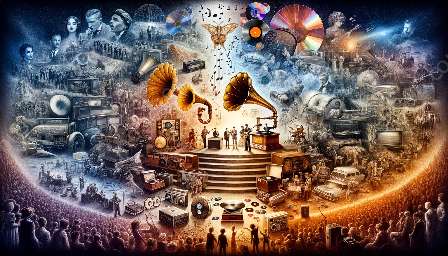Music is a ubiquitous part of human existence, influencing and reflecting the cultural and sociological fabric of society. It plays a significant role in shaping individual and collective identities, cultural practices, and social structures. Examining the impact of music on society delves into how it intersects with history, the music industry, and the music business.
History of the Music Industry
The history of the music industry is closely intertwined with the evolution of societal values, technological advancements, and economic structures. From the early days of sheet music to the present digital age, the music industry has mirrored and influenced cultural and sociological norms and trends. The birth of the recording industry transformed the dissemination of music, allowing it to reach wider audiences and permeate diverse social circles. This shift not only revolutionized the way music was consumed but also contributed to the creation of new cultural landscapes and social divisions. For example, the rise of rock and roll in the mid-20th century catalyzed generational conflicts and cultural shifts, leading to the emergence of youth subcultures and countercultural movements that challenged traditional social norms. Similarly, the globalization of music in the contemporary era has facilitated cross-cultural exchanges, fostering interconnectedness and the appreciation of diverse cultural expressions.
Music Business
The music business is a multifaceted industry that involves the production, distribution, and promotion of music. Understanding the cultural and sociological implications of music is essential in navigating the complexities of the music business. The industry's practices and commercial strategies are deeply entwined with societal values, consumer behavior, and cultural preferences. The commodification of music, driven by profit motives, often reflects and perpetuates societal power dynamics, influencing the representation and visibility of different cultural and social groups. Moreover, the music business serves as an avenue for social commentary and advocacy, allowing artists to amplify cultural narratives and societal issues, thereby shaping public discourse and social consciousness.
The Influence of Music on Cultural Identity
Music is a vital component of cultural identity, embodying and transmitting the values, traditions, and experiences of various communities. The sociological implications of music on cultural identity are profound, as it serves as a medium through which individuals and communities assert their distinctiveness and negotiate their place within the larger social framework. Whether through folk songs, national anthems, or contemporary music genres, music plays a pivotal role in the preservation and evolution of cultural identities, uniting people and fostering a sense of belonging among diverse cultural groups. Additionally, music acts as a vehicle for cultural exchange and hybridization, contributing to the dynamic and fluid nature of cultural identities in an interconnected world.
Music and Social Structures
Music has the power to shape and reflect social structures, perpetuating existing hierarchies or challenging established norms. The sociological implications of music in society extend to its influence on social stratification, community dynamics, and power relationships. Certain genres and musical styles are associated with specific social classes or subcultures, often serving as markers of cultural capital and social distinction. At the same time, music has been instrumental in mobilizing social movements and advocating for social change, exemplified by protest songs and anthems that have galvanized marginalized communities and catalyzed collective action. Furthermore, music fosters social cohesion and solidarity by providing a platform for shared experiences and collective rituals, reinforcing social bonds and fostering a sense of community.
The Impact of Music on Individuals
Music exerts profound psychological and emotional effects on individuals, influencing their values, beliefs, and behaviors. From shaping personal identities to facilitating interpersonal connections, music significantly impacts individuals' social and emotional well-being. The sociological implications of music on individuals encompass its role in constructing and reinforcing social norms, fostering empathy and understanding, and providing a means for personal expression and self-discovery. Moreover, music consumption and participation cultivate social networks and affinity groups, influencing individuals' socialization patterns and community engagements.
Conclusion
Understanding the cultural and sociological implications of music in society is essential for comprehending its multifaceted role in shaping historical trajectories, fueling the music industry, and influencing social structures. Music serves as a mirror reflecting the complexities and nuances of human societies, contributing to the formation of cultural identities, the negotiation of social structures, and the evolution of societal values. By examining the interplay between music and society, we gain insights into the profound ways in which music transcends entertainment, serving as a powerful force in shaping human experiences and societal dynamics.









































